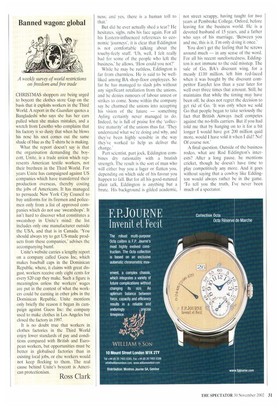Banned wagon: global
A weekly stiney of world restrictions on freedom and free trade
CHRISTMAS shoppers are being urged to boycott the clothes store Gap on the basis that it exploits workers in the Third World. A report in the Guardian quotes a Bangladeshi who says she has her ears pulled when she makes mistakes, and a wretch from Lesotho who complains that his factory is so dusty that when he blows his nose his snot comes out the same shade of blue as the T-shirts he is making.
What the report doesn't say is that the organisation demanding the boycott, Unite, is a trade union which represents American textile workers, not their brethren in the Third World. For years Unite has campaigned against US companies which have transferred their production overseas, thereby costing the jobs of Americans. It has managed to persuade New York City Council to buy uniforms for its firemen and policemen only from a list of approved companies which do not use 'sweatshops'. It isn't hard to discover what constitutes a sweatshop in Unite's mind: the list includes only one manufacturer outside the USA, and that is in Canada. 'You should always try to get US-made products from these companies,' advises the accompanying burnt Unite's website carries a lengthy report on a company called Guess Inc, which makes baseball caps in the Dominican Republic, where, it claims with great disgust, workers receive only eight cents for every $20 cap they make. Such a figure is meaningless unless the workers' wages are put in the context of what the workers could be earning in other jobs in the Dominican Republic. Unite mentions only briefly the reason it began its campaign against Guess Inc: the company used to make clothes in Los Angeles but closed the factory in 1997.
It is no doubt true that workers in clothes factories in the Third World enjoy lower standards of pay and conditions compared with British and European workers, but opportunities must be better in globalised factories than in existing local jobs, or else workers would not keep flocking to them. The real cause behind Unite's boycott is Ameri
can protectionism. Ross Clark


























































































 Previous page
Previous page